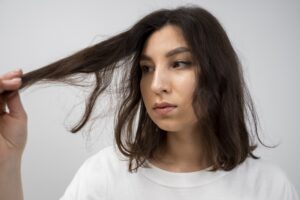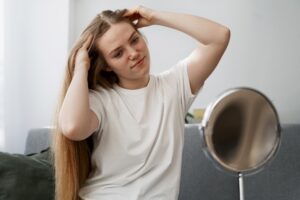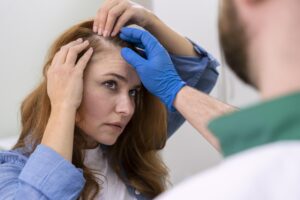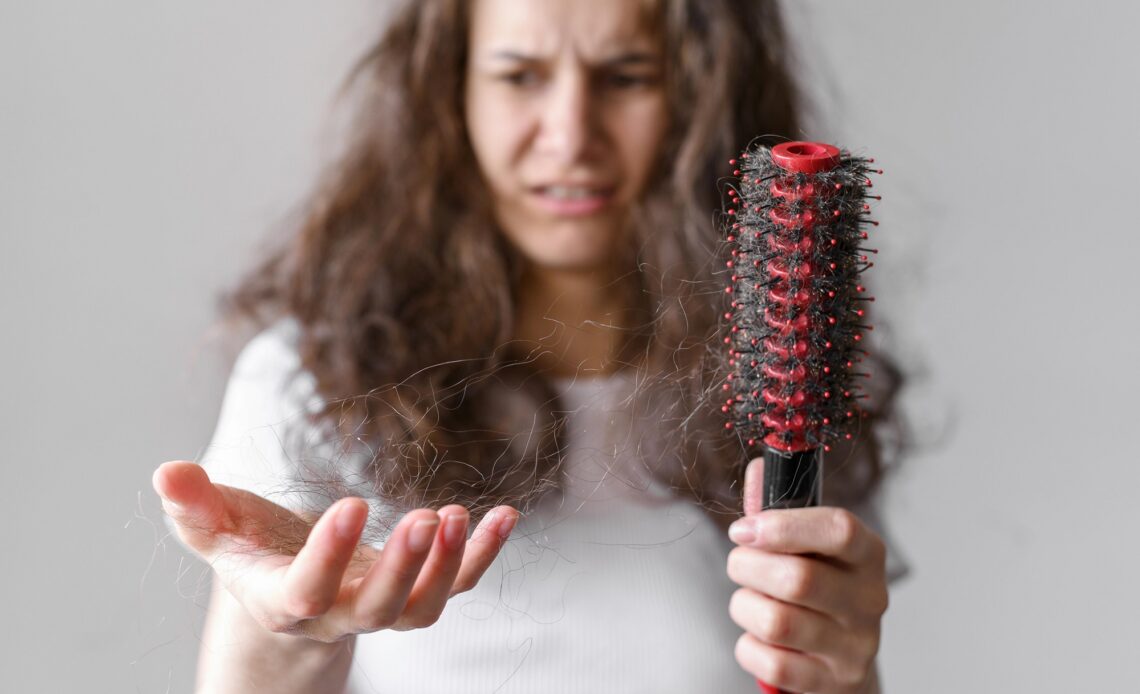Our hair is a reflection of our overall health and well-being. When our hormones are out of balance, it can have a significant impact on the health and growth of our hair. Hormonal hair loss is a common issue that affects many individuals, particularly those dealing with conditions like polycystic ovary syndrome (PCOS) and menopause.
Hormones play a crucial role in the hair growth cycle, which consists of three distinct phases: anagen (growth), catagen (transition), and telogen (resting). Any disruption in this delicate balance can lead to a variety of hair-related issues, including thinning, shedding, and even baldness.
Hormonal imbalances can be caused by a wide range of factors, including genetics, stress, diet, and underlying medical conditions. When our hormones are out of sync, it can trigger a cascade of physiological changes that can have a direct impact on the health and appearance of our hair. Understanding the connection between hormones and hair loss is the first step in addressing this common concern.
What is PCOS and How It Affects Hair Growth?

Polycystic ovary syndrome (PCOS) is a hormonal disorder that affects approximately 5-10% of women of reproductive age. It is characterized by an excess of androgens (male hormones) in the body, which can disrupt the delicate balance of hormones and lead to a variety of symptoms, including hair loss.
In PCOS, the excess of androgens can interfere with the hair growth cycle, causing the hair follicles to enter the telogen (resting) phase prematurely. This results in increased shedding and thinning of the hair, particularly on the scalp’s crown and temples. The excess androgens can also cause the hair follicles to become more sensitive to the effects of dihydrotestosterone (DHT), a byproduct of testosterone that can further contribute to hair loss.
Additionally, PCOS can lead to other physical changes, such as irregular menstrual cycles, acne, and weight gain, all of which can exacerbate the hair loss experience. Understanding the connection between PCOS and hair loss is crucial for individuals seeking to manage this condition and regain their hair health.
The Connection Between Menopause and Hair Loss
Menopause is another hormonal transition that can have a significant impact on hair health. As women approach and enter the menopausal stage of life, their bodies undergo a dramatic shift in hormone levels, particularly a decrease in estrogen.
Estrogen plays a crucial role in the hair growth cycle, as it helps to maintain the health and strength of the hair follicles. When estrogen levels decline during menopause, it can lead to a weakening of the hair follicles, resulting in increased shedding and thinning of the hair.
Furthermore, the decrease in estrogen can also cause the hair follicles to become more sensitive to the effects of testosterone, leading to additional hair loss. This can be particularly noticeable on the crown and temples, where the hair may become increasingly sparse and wispy.
Other Hormonal Conditions that Contribute to Hair Loss

While PCOS and menopause are two of the most well-known hormonal conditions that can contribute to hair loss, there are several other hormonal imbalances that can also have a detrimental effect on hair health.
Thyroid disorders, both hypothyroidism (underactive thyroid) and hyperthyroidism (overactive thyroid), can disrupt the delicate balance of hormones and lead to hair loss. Thyroid hormones play a crucial role in the hair growth cycle, and any imbalance can result in thinning, shedding, and even bald patches.
Adrenal gland disorders, such as Cushing’s syndrome and Addison’s disease, can also contribute to hormonal hair loss. These conditions are characterized by an imbalance in the production of cortisol, a hormone that can have a direct impact on the hair growth cycle.
Additionally, certain hormonal changes during pregnancy and postpartum can lead to temporary hair loss, known as telogen effluvium. This is a common occurrence as the body adjusts to the fluctuations in hormone levels during and after pregnancy.
Signs and Symptoms of Hormonal Hair Loss
Recognizing the signs and symptoms of hormonal hair loss is the first step in addressing the issue. Some of the most common indicators of hormonal hair loss include:
- Excessive shedding, with noticeable clumps of hair in the shower, on your brush, or on your pillow
- Thinning of the hair, particularly on the crown, temples, or part line
- Bald patches or areas of sparse hair growth
- Slow or stunted hair growth
- Dull, brittle, or dry hair texture
- Changes in the hair’s texture or curl pattern
It’s important to note that these symptoms can also be caused by other factors, such as stress, nutritional deficiencies, or underlying medical conditions. If you are experiencing any of these signs, it’s crucial to seek professional medical advice to determine the underlying cause and develop an appropriate treatment plan.
Diagnosing Hormonal Hair Loss
Diagnosing the cause of hormonal hair loss typically involves a comprehensive evaluation by a healthcare professional, such as a dermatologist or endocrinologist. The diagnostic process may include:

- A thorough medical history and physical examination to assess any underlying conditions or lifestyle factors that may be contributing to the hair loss
- Blood tests to measure the levels of various hormones, including testosterone, estrogen, thyroid hormones, and cortisol
- Scalp examination and potentially a biopsy to rule out other causes of hair loss, such as scarring or inflammatory conditions
- In some cases, a scalp biopsy or trichoscopy (examination of the hair and scalp using a specialized camera) may be performed to obtain a more accurate diagnosis
By identifying the underlying hormonal imbalance, healthcare professionals can develop a targeted treatment plan to address the root cause of the hair loss and help restore hair health.
Treatment Options for Hormonal Hair Loss
Once the underlying hormonal imbalance has been identified, there are several treatment options available to address hormonal hair loss:
- Medication: Prescription medications, such as anti-androgen drugs (e.g., spironolactone) or hormone replacement therapy (e.g., estrogen, progesterone), can help regulate hormone levels and promote healthy hair growth.
- Topical treatments: Over-the-counter or prescription topical treatments, such as minoxidil, can help stimulate hair follicles and improve hair density.
- Supplements: Certain vitamins and minerals, like biotin, iron, and zinc, may help support healthy hair growth and prevent further hair loss.
- Laser therapy: Low-level laser therapy (LLLT) has been shown to improve hair density and thickness in some individuals with hormonal hair loss.
- Lifestyle changes: Adopting a healthy lifestyle, including a balanced diet, regular exercise, and stress management, can help support overall hormonal balance and hair health.
It’s important to work closely with a healthcare professional to develop a personalized treatment plan that addresses the specific underlying cause of the hormonal hair loss. This may involve a combination of medical interventions and lifestyle modifications for the best possible outcome.
Lifestyle Changes to Support Healthy Hair Growth
In addition to medical treatments, there are several lifestyle changes that can help support healthy hair growth and mitigate the effects of hormonal hair loss:

- Stress management: Chronic stress can disrupt the delicate balance of hormones and contribute to hair loss. Incorporating stress-reducing activities, such as meditation, yoga, or deep breathing exercises, can help manage stress levels and promote healthier hair growth.
- Balanced diet: Ensuring a nutrient-rich diet that includes essential vitamins, minerals, and proteins can help nourish the hair follicles and support the hair growth cycle. Foods rich in biotin, iron, zinc, and omega-3 fatty acids can be particularly beneficial.
- Hydration: Staying well-hydrated by drinking plenty of water can help maintain the health and strength of the hair follicles, preventing dryness and brittleness.
- Gentle hair care: Avoiding harsh styling techniques, such as excessive heat, chemical treatments, and tight hairstyles, can help reduce further damage to the hair and scalp, allowing for healthier growth.
- Scalp massage: Gently massaging the scalp can help improve blood circulation and stimulate the hair follicles, potentially promoting hair growth.
By incorporating these lifestyle changes into your daily routine, you can help support your body’s natural hair growth cycle and mitigate the effects of hormonal hair loss.
Tips for Managing Hormonal Hair Loss
Coping with hormonal hair loss can be a challenging experience, but there are several strategies you can employ to manage the situation and maintain a positive outlook:
- Educate yourself: Understanding the underlying causes of your hormonal hair loss can help you feel more in control and empowered to seek the appropriate treatment.
- Be patient: Hair growth is a gradual process, and it may take several months to see the full effects of any treatment. Remain patient and consistent with your management plan.
- Embrace temporary solutions: Consider using hair toppers, wigs, or extensions to help conceal thinning or bald spots while you work on restoring your hair health.
- Seek support: Connect with others who are experiencing similar hormonal hair loss challenges through online communities or support groups. Sharing experiences and coping strategies can be invaluable.
- Focus on self-care: Prioritize activities that make you feel confident and comfortable in your own skin, such as engaging in hobbies, practicing self-care rituals, or exploring new hairstyles that make you feel beautiful.
Remember, hormonal hair loss is a common and treatable condition. With the right approach, support, and patience, you can regain your hair health and confidence.
Conclusion
Hormonal imbalances can have a significant impact on our hair health, leading to issues like thinning, shedding, and even baldness. Conditions like PCOS and menopause are two of the most well-known culprits, but there are several other hormonal disorders that can also contribute to hair loss.
By understanding the connection between hormones and hair growth, individuals can take proactive steps to address the underlying cause and regain their hair health. This may involve a combination of medical interventions, lifestyle changes, and self-care strategies.
Remember, hair loss can be a sensitive and emotional issue, but you are not alone. With the right support and treatment, it is possible to overcome hormonal hair loss and embrace a vibrant, healthy head of hair. Take the first step today and reclaim your hair confidence.


